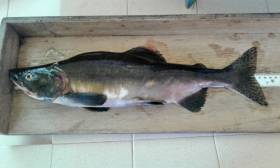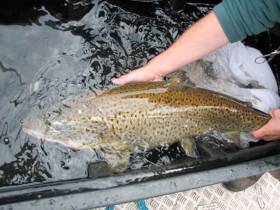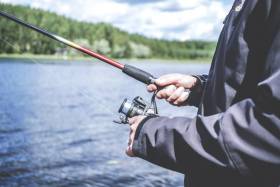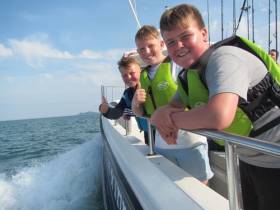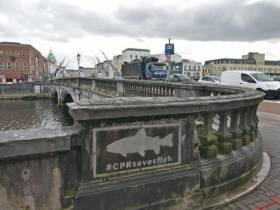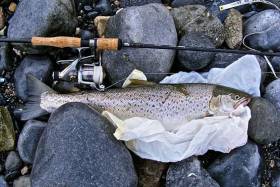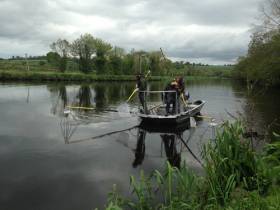Displaying items by tag: IFI
Inland Fisheries Ireland (IFI) has renewed its appeal to angling enthusiasts and the general public to be vigilant and report the presence of any Pacific pink salmon encountered in Irish river systems over the coming months.
In 2017, this non-native fish species unexpectedly appeared in unprecedented numbers in multiple river systems in the south-west, west and north-west of the country.
As pink salmon predominantly have a two-year lifecycle, there is potential for the species to reappear in Irish rivers again this year and every second, so-called ‘odd’ year thereafter.
However, they can also turn up in ‘even’ years and a single specimen was recorded in the River Suir in 2018.
Also known as humpback salmon, pink salmon are a migratory species, native to river systems in the northern Pacific Ocean and nearby regions of the Bering Sea and Arctic Ocean.
The species also has established populations in rivers in northernmost Norway and in the far northwest of Russia, originating from stocking programmes undertaken in this part of Russia since the 1950s until 2001.
Although a single specimen was first recorded in Ireland in 1973, they were very rare in Irish waters until 2017.
In the past week, pink salmon have been reported returning to rivers further south in Norway than anticipated which increases the likelihood of their reappearance in Irish rivers this year.
“The potential presence of pink salmon in Irish rivers again is of ongoing concern to Inland Fisheries Ireland as its presence in large numbers may negatively impact some of Ireland’s native species such as Atlantic salmon and sea trout as well as estuarine and coastal marine fish species and their associated ecosystems,” says Dr Cathal Gallagher, IFI’s head of R&D.
“Despite only very limited information being currently available to assess such threats, the climatic and environmental conditions in Ireland are considered quite amenable to facilitate the establishment of Pacific pink salmon populations in Irish river systems.”
IFI has developed an identification guide (2.31 MB PDF) to help anglers and the general public identify pink salmon.
Anglers are asked to report catches of pink salmon to IFI’s 24 hour confidential hotline number at 1890 34 74 24 or 1890 FISH 24. As these fish die after spawning, some dead specimens could also be encountered along Irish rivers.
Anyone who catches a pink salmon is asked to:
- Take a photograph of the fish
- Tag the fish and present it to IFI and a new tag will be issued to replace the tag used
- Record the date and location of capture, and the length and weight of the fish
- Keep the fish and do not release it back into the water (even in rivers only open for catch and release angling)
IFI will then arrange collection of the fish for further examination. This will help establish the abundance and extent of distribution of the species in Irish waters.
Two Anglers Plead Guilty To Illegal Fishing Methods On Cong River During Annual Closed Season
Two anglers recently appeared in court on charges relating to illegal fishing methods on the Cong River and fishing during the closed season.
On Thursday 23 May, Mindaugas Jenkus of Claremorris, Co Mayo and Dalius Bureninas of Birr, Co Offaly appeared in front of Judge Mary Fahy at Clifden District Court in respect of breaches of fisheries legislation on the Cong River which occurred on 9 September 2018.
Both defendants represented themselves and pleaded guilty to strokehauling (using a weighted instrument or device with a rod and line or otherwise to foul-hook fish) and fishing out of season on the Cong River.
Bureninas also pleaded guilty to a further charge of obstruction under Section 301 (7) of the Fisheries (Consolidation) Act 1959.
Fisheries officer Paul Reynolds outlined the facts of the case to the court, while assistant fisheries inspector Barry Kelly also told the court that the Cong River was a very important salmonid fishery with has a large run of Atlantic salmon and a good stock of brown trout.
It is also of particular conservation interest in relation to ferox trout, for which the river is renowned.
The Cong River is one of the main tributaries of Lough Corrib, and is one of the most important salmon rivers in the west of Ireland
Fisheries inspector Pat Gorman stated that these offences were very serious due to the conservation status of the Cong River, when asked his opinion by Judge Fahy.
The judge commented on how serious a matter these offences were and referred to Bureninas giving a false name and address when lawfully demanded. She also noted that Mr Jenkus had a recent conviction for a similar fisheries offence.
Judge Fahy stated that if both defendants paid costs of €600 each to the court at a sitting of Clifden District Court on 26 September, she may deal with the matter by way of a somewhat reduced fine.
She also warned both men to be on their best behaviour and not to come to the attention of Inland Fisheries Ireland (IFI) again as there was a risk of a custodial sentence being imposed.
“The Cong River is one of the main tributaries of Lough Corrib, is one of the most important salmon rivers in the west of Ireland and provides habitat for a very unique salmonid sub-species, ferox trout,” said IFI chief executive Dr Ciaran Byrne when commenting on the case.
“The Cong River is closed to angling during September as a conservation measure relating to both Atlantic salmon and ferox trout. The river attracts many anglers and tourists annually to fish for these unique wild salmonid species.”
Anglers Reminded Of Water Safety Guidelines As Drowning Death Toll Reaches 3 For 2018
Three anglers have died in Ireland so far this year as a result of drowning, according to the latest figures from Irish Water Safety.
The sobering news has prompted a reminder from Inland Fisheries Ireland to all anglers to follow safety guidelines when fishing either on waterways, on the coast or at sea.
As angling is a water-based activity, anglers often have to deal with changing conditions and hidden dangers — but there are a number of simple tips to follow to stay safer when going fishing:
- Wear a life jacket.
- Follow advice on warning signs, permits and notices.
- Don’t take any risks when wading or fishing from boat, shore or bank.
- Check the weather forecast and tide tables before you go.
- Take time to observe weather, water and tide conditions while fishing.
- Fish with a partner/buddy or let someone know where you’re going.
- Take a fully charged mobile phone in a waterproof case/bag.
- Wear appropriate clothing and footwear.
“There are 273,000 domestic anglers in Ireland who enjoy fishing at the many scenic destinations across the country. Many anglers have been fishing for many years and may feel experienced on being near or on the water however we would appeal to anglers to follow these simple safety steps at all times,” says IFI’s Suzanne Campion.
“Although game angling has finished for 2018, angling for other species continues in many isolated peripheral and rural areas and with winter approaching, it is important to stay safe.”
Safety on the Water’s Angling Water Safety Guidelines details guidelines around safety on lakes and at sea alongside important information on tides and currents, what to wear, and the type of boat you should use.
“We would ask anglers to take some time to familiarise themselves with this safety information and to remember their safety is a priority when angling,” Campion adds.
Also useful is the Angling Safety Checklist, and Fishing in Ireland’s detailed online guide to water safety.
Deadline Approaching For 2018 Oyster Dredge Licences
#Fishing - Fishermen wishing to apply for oyster dredge licences for the 2018 season must submit a completed official form to the relevant River Basin District Office before noon on Friday 24 November.
This process became necessary due to the fact that there are many Special Areas of Conservation (SACs) and Natura 2000 sites in Ireland that also contain oyster fisheries.
As the exploitation of these fisheries will require dredging, appropriate assessment of these fishing activities will have to be undertaken.
In the absence of appropriate assessments, against predetermined conservation objectives, it is necessary to ensure that no intensification of the fishing activity for oysters be permitted.
This has been further strengthened by the issuing of a direction from the minister in accordance with Section 278 (5)(a) of the Fisheries (Consolidation) Act 1959 as amended and the Habitats Directive as transposed by European Commission (Birds and Natural Habitats) Regulations 2011 (SI 477/ 2011).
As yet, no appropriate assessment of the potential impact of the wild oyster fishery has been completed for most locations within SACs and, in the absence of the necessary advice, Inland Fisheries Ireland must ensure that no intensification of the oyster fishery takes place.
As a consequence, IFI must continue to limit the number of licences that can be issued for 2017.
The official procedure and application form are available for download at the IFI website HERE.
Applicants must complete the application form in full and ensure that any relevant information that will assist IFI in assessing their application is submitted with the application.
The relevant licence fee for 2018 is €89 and this must also accompany the application. Unsuccessful applicants will have their fee refunded in full. Further information on the process is available with the application form.
Application forms are also available from Inland Fisheries Ireland, Teach Breac, Earl’s Island, Galway, H91 K6D2 (Tel 091 563118), from any Inland Fisheries Ireland District Office, or from Inland Fisheries Ireland head office, 3044 Lake Drive, Citywest Business Campus, Dublin 24, D24 Y265.
Finalists Announced In Film Competition For Junior Anglers
#Angling - Four fishing clubs have been announced as finalists in Inland Fisheries Ireland’s Fish & Film Competition.
Junior members of Ballyshannon and District Angling Association in Co Donegal, Newport Sea Angling Club in Co Mayo, Whitelake Angling Club in Co Westmeath and the Sphere 17 Youthgroup in Darndale, North Dublin submitted entries which are being showcased online.
These clubs will now progress to the next stage of the competition, launched in June to encourage young people to spread the word about fishing.
Ballyshannon and District Angling Association’s film entry focused on a junior fishing day held at Lough Unshin, while Whitelake Angling Club’s submission shows young angling enthusiasts enjoying a quiet day’s fishing and presenting the viewer with their skills.
Newport Sea Angling Club’s entry highlighted the club’s recent National Junior Competition and Daniel Peacock Memorial event held in July, with all the excitement of a real competition day, while Sphere 17’s film take viewers on a sea angling trip off the East Coast.
The clubs are now appealing to the public to watch and share their film entries. The finalists will go forward to a junior fishing competition where they will compete against other entrants to be in with a chance of winning the top prize of €1,000 fishing tackle voucher for their club, or one of the €250 runner-up prizes which are also up for grabs.
“It is fantastic to hear from the next generation of anglers to find out more about what drives them to keep up fishing,” said IFI’s head of business development Suzanne Campion. “These entries really give a taste of what fishing is all about for junior anglers - I would like to commend them on their fantastic entries and wish them the best of luck at the next stage of the competition which sees them enjoying a free day’s fishing.”
The Fish & Film competition supports the objectives of Inland Fisheries Ireland’s National Strategy for Angling Development, which aims to make angling accessible and attractive to all while establishing it as a key leisure pursuit.
There are currently 273,000 domestic anglers in Ireland, and IFI aims to grow participation rates by 0.5% annually.
Visit the IFI website for more information on the competition.
Inland Fisheries Ireland Seeks New Human Resources Head
#Jobs - Inland Fisheries Ireland (IFI) is seeking a Head of Human Resources to be based at its headquarters in Dublin’s Citywest.
Reporting to the CEO, the successful candidate would be responsible for the management and direction of IFI’s Human Resources Division, for the achievement of functional targets and business objectives, and for the strategic development and management of key areas to support IFI in achieving its strategic corporate goals.
This includes management of its human resource assets, and organisational development/optimisation through the identification and implementation of progressive, people-orientated development policies.
This position requires an enabler of change, who will be responsible for the leadership of the strategic HR function within IFI and the implementation of a diverse range of HR programmes.
IFI is looking for a practical and pragmatic HR practitioner with a track record of influencing and operating at a senior level, delivering a professional, results-focused HR service in a unionised environment, combined with experience of negotiating the complexities of transformational change.
The closing date for applications is 5pm on Tuesday 1 August. Full details of the role are available on the IFI website HERE.
‘CPR’ Saves Fish As New Conservation Campaign Launches
#Angling - CPR saves fish, according to Inland Fisheries Ireland (IFI) at the launch of a new campaign to highlight angling and the importance of conservation.
The hashtag #CPRsavesfish has been placed across a number of bridges and high footfall locations across the country to engage the public around the pursuit of conservation-focused angling.
‘CPR’ stands for ‘catch-photo-release’ and refers to a method of angling where a fish is caught and subsequently returned unharmed back into the water.
This angling technique is proven to contribute to the maintenance of healthy fish stocks and ensures future generations can continue to enjoy the recreational and economic benefits of the fisheries resource.
IFI is supporting catch and release across all types of angling including pike, coarse, salmon and trout fishing as well as sea angling. The method results in positive survival rates for fish when caught using best practise methods.
Research carried out by IFI and the Norwegian Institute for Nature Research in 2014 examined the survival of salmon after catch and release fishing in three Irish rivers: the Owenmore in Co Mayo, the Mulkear in Co Limerick and the Feale in Co Kerry. Overall, 92% of the Atlantic salmon recorded after tagging survived after catch and release.
The #CPRsavesfish stencils can be found in urban locations in each River Basin District in Ireland including Dublin, Cork, Galway, Limerick, Letterkenny and Kilkenny.
The hashtag stencils, which have been power washed with water onto pavements, are completely environmentally friendly and are expected to fade naturally in the coming weeks.
Suzanne Campion, head of business development at IFI, said: “This awareness campaign aims to put angling on the general public’s radar by playing on the concept of CPR as a lifesaving mechanism and to engage existing anglers around the practise of catch and release fishing.
“Catch-photo-release angling ensures the sustainability of our fisheries resource in the long term with most sporting anglers in Ireland already practicing catch and release to some degree, recognising that it ensures the maintenance of healthy fish stocks and the sustainability of the sport in the long term.
“Angling is a pursuit that can be enjoyed at any age or ability and Ireland has a host of top angling destinations right on doorsteps across the country. We are encouraging novice anglers to visit the #CPRsavesfish website to find out more about how they can try fishing in their local area.”
There are currently 273,600 domestic anglers in Ireland with a further 163,000 international visitors who enjoy fishing here. Angling supports 11,000 jobs nationwide, often in rural and peripheral communities, and contributes €836 million to the Irish economy every year.
#Angling - Inland Fisheries Ireland (IFI) is now explicitly empowered to bring and prosecute summary proceedings for fisheries offences as the Inland Fisheries (Amendment) Act 2017 comes into force, following the signing of a commencement order by Environment Minister Denis Naughten yesterday (Tuesday 11 July).
The revised legislation resolves an issue over IFI’s power to prosecute, which arose in February 2017 and resulted in required legal amendments.
Earlier this year IFI was informed by the Department of Communications, Climate Action and Environment that it had received legal advice to the effect that IFI did not have explicit power to prosecute offences under the Fisheries Acts.
The news brought a halt to all legal actions against poaching and other illegal angling and inland fisheries activity, as previously reported on Afloat.ie.
However, the legislation commenced yesterday confirms that IFI has the power to resume legal action for offences under the Fisheries Acts.
In the interim period since the legislative issue came to light, fisheries officers continued to work as normal, and any offences detected during the past six-month period will now be able to proceed to prosecution in the normal manner.
“We welcome the commencement of this new legislation, which safeguards our ability to prosecute, and as a result, protects our fisheries resource which is of significant environmental, social and economic value to our country,” said IFI chief executive Dr Ciaran Byrne.
“This means that our staff can continue to ensure that this valuable natural resource is protected, conserved, managed and developed for the communities it serves across Ireland.”
Public Consultation On Sea Trout Policy Development
#Angling - Inland Fisheries Ireland (IFI) is now inviting submissions from the public on the development of a national sea trout policy.
Sea trout in Ireland, in the context of legislation and management, has traditionally been closely identified with salmon and this consultation process will consider the requirement of establishing a separate identity for sea trout.
The policy will make recommendations which will inform a range of issues including sustainable management of stock and any possible legislative changes that may emerge in the future.
Other areas to be addressed will include protection and conservation (including biodiversity, habitat protection and interactions with aquaculture), stock assessment, and education and promotion.
Sea trout, the migratory form of brown trout, leave freshwater as a juvenile fish typically after two years. They enter marine waters where they feed heavily before returning to freshwater, usually to breed with some components of the population spawning several times over their lifetime.
As a result, the sea trout is a valuable angling fish which occurs in most coastal rivers and inshore waters.
Sea trout has significant economic and cultural importance in Ireland with potential for further development. This is coupled with major concerns about sea trout stock declines in some systems nationally, most particularly along the western seaboard, and requires that future management of sea trout is underpinned by a comprehensive policy.
IFI says it recognises the diverse opinions of stakeholders regarding the future management of sea trout and their fisheries and encourages stakeholder engagement through this public consultation process.
Interested parties are invited to make submissions which will be reviewed and considered by the Sea Trout Policy Group, which comprises of a range of representatives with a broad experience of sea trout within IFI.
“The sea trout is a complex migratory fish frequenting freshwater, estuaries and marine waters,” says IFI chief executive Ciaran Byrne. “The biodiversity, economic and cultural value of this type of fish requires a policy direction to manage this precious resource sustainably and to conserve it into the future.
“This public consultation, and ultimately the policy recommendations which will emerge, will capture stakeholder views and incorporate the broad scope of management issues that will underpin future policy.”
The public consultation period will run for five weeks until Wednesday 12 July. All submissions must be made in writing and will be published on the IFI website. Submissions should be marked ‘Public Consultation – Sea Trout Policy’ and can be submitted to [email protected] or by post to:
Sea Trout Policy
Inland Fisheries Ireland
3044 Lake Drive
Citywest Business Campus
Dublin 24
D24 Y265
Information on the consultation is available from the IFI website or from any IFI office.
#Angling - New research from Inland Fisheries Ireland (IFI) has revealed the state of fish stock levels and the different species present within the River Barrow catchment.
The River Barrow is Ireland’s second longest river after the River Shannon, and this research is the first large scale catchment-wide survey undertaken in the popular angling waterway to assess the status of all fish species present.
The IFI report reveals that 39% of water sites surveyed on the catchment had high or good fish status.
The ecological fish classification status of various sites was calculated as part of the survey to assist with future fisheries management plans. This included assessment of 35 of the River Barrow’s main channel sites and a further 83 sites within the river’s sub catchments.
Overall, ‘High’ fish status was recorded on five per cent of sites, and ‘Good’ status was assigned to 34% of sites.
The positive fish status was recorded in the upper reaches of the River Barrow main channel above Mountmellick, Co Laois, downstream of weirs where flow and habitat conditions were more favourable for a larger range of fish species, and generally in the middle and lower sub-catchment river systems.
However, more than 60% of the sites were cited as moderate fish status or less.
The main reasons for less than good fish status were poor water quality, poor habitat, the presence of artificial barriers impeding migratory fish passage and possible competition from the invasive dace species.
Further investigation of these sites will be required prior to the implementation of mitigation measures such as improvements to water quality, habitat enhancement works to improve spawning and nursery areas or tree planting to provide cover for fish.
In addition to classifying the fish status of the sites, the species of fish present were audited as part of the research.
More than 10,000 fish were caught and released as part of the survey with a total of 14 fish species and one hybrid (mix) species identified.
Dace, an invasive fish species, was the commonest species in the main channel sites, followed by roach, perch and juvenile salmon, while salmon and brown trout were the commonest species in the sub-catchment rivers.
Pike were found in 54% of the main channel sites surveyed and brown trout were recorded at 45% of these sites.
Other fish species logged included minnow, gudgeon, eel, stone loach, three-spined stickleback and flounder, as well as roach-bream hybrids.
“This survey is the first of its kind within this large catchment area and it tells us a great deal about what is happening on these sites,” said IFI senior research officer Dr Fiona Kelly.
"It is evident that we have an abundance of different types of wild fish species present; however we also know that there are challenges for the catchment in terms of water quality, habitat and invasive species which will need to be addressed. Ultimately, this research will inform future fisheries management and protection strategies.”
IFI says it encourages all stakeholders on the River Barrow to support the conservation and protection of the river, its tributaries and the species contained within it.
It also hopes that community groups will consider what they can do to improve its water quality and ecology and create a healthy water environment for the benefit of all users.


























